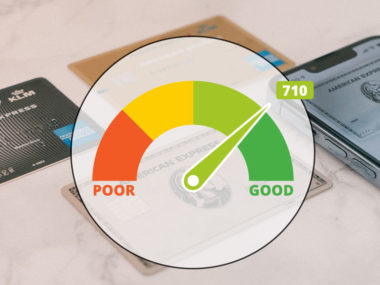A credit score of 669 places you within the population of consumers who have a fair credit score. This score is lower than the average U.S. credit score. Generally speaking, 17% of consumers have fair FICO scores. You can learn more about your credit score report from the annual credit report website.
Table of Contents
Why Your Credit Score Is 669
There’s a lot that can affect your credit score and result in you having a low score or a fair one. Some credit-lowering factors can be the direct result of your actions; however, some may not be.
For that reason, it is important to keep track of your financial activities, your borrowing habits, your loans, as well as your debt payments, and to budget properly. Here are some reasons why your credit score may be 669:
1. You Have a High Balance on One of Your Cards
It is not enough simply to pay your card off on time. It is imperative to know how much balance you carry on each one of your cards.
The credit utilization ratio, or how much of that credit you use, influences your score more than anything else, with the exception of paying on time.
For that reason, you should aim to use no more than 30% of your credit limit on any card.
2. There Is a Missed Payment
If there is a missed payment that is 30 days late, it can negatively affect your credit score. Late payments can stay on your credit report for up to seven years.
To combat that, you should make sure that each of your payments is set to go out on time or that you have a set schedule that does not result in late payments.
3. Identity Theft
If the score that is being reported is much lower than you think it should be, someone may be opening accounts under your name. Moreover, this can also happen if the credit bureau has mixed up your name with others.
4. You Applied for New Credit
It is possible to lose a few points on your credit score every time you apply for a new credit card or loan.
Many credit applications are associated with a high risk that you will not pay them on time, resulting in a negative effect on your credit score.
The solution is to stop applying for new credit cards and/or loans.
5. There Is a Default Judgment You Are Not Aware Of
There may be a default judgment filed against you that you know nothing about. This could happen if a summons and complaint letter is misdelivered, so you end up never knowing about the lawsuit.
It could also be the case that the person who decided to sue you intentionally decided to fail to notify you about the court case. This activity is what is called a “sewer service.”
What Can You Do With a 669 Credit Score?
With a 669 credit score being considered fair, these are the things you are allowed to apply for:
- Apply for a mortgage.
- The minimum credit score to apply for a conventional mortgage is 620.
- Apply for a housing loan.
- Apply for credit cards.
- Apply for an auto loan.
Even if you have a fair credit score, there are still financial opportunities available to you that are not available to those with a low credit score.
That being said, you should do your best to increase your credit score through financial best practices and personal financial responsibility so as to not limit yourself to future financial and personal possibilities.
How to Improve a 669 Credit Score
To turn this credit score from fair to excellent, you may want to follow some of these steps. In doing so, you will be able to better understand what goes into a good and excellent credit score.
1. Pay Down Existing Debt
Paying down existing debt can help bring your credit score up during the short term because it lowers your credit utilization ratio. This ratio is calculated by dividing the amount of credit you use by the total of credit limits. Credit utilization accounts for 30% of your FICO score.
2. Make Your Payments on Time
The most important aspect of your credit score is on-time payments. Even a single missed payment can negatively impact your score. Look at all your outstanding bills and make sure to pay them on time or you may seriously hurt your credit score.
Be sure to keep track of all monthly debt payments you’re responsible for and create a repayment plan that helps you avoid defaulting on your payments.
3. Check Credit Reports for Inaccuracies
Make sure you regularly check your credit report to see whether everything that’s listed on it should be there. If you do not want to deal with it yourself, you can always ask credit repair companies to do the work for you. These companies are well versed in knowing how to use resources to increase a given credit score.
Improving Your Credit Opens Up Many Possibilities for Your Future
By taking the time and effort to raise your credit score from fair to good or even to exceptional, you’ll be able to take advantage of and anticipate new financial opportunities.
You will be allowed to apply for different types of loans with better interest rates and lower fees. Lenders will sometimes offer lower rates to those who have high credit scores in confidence that the loan they’re applying for will be paid off on time.
Having to climb out of the financial hole that having a low credit score buries you in is time-consuming, expensive, and stressful. It’s easier to pay more attention to a fair credit score now and work on raising it to good or excellent than it is to be surprised by a low credit score and work on raising that to fair.
Image Source: https://depositphotos.com/





